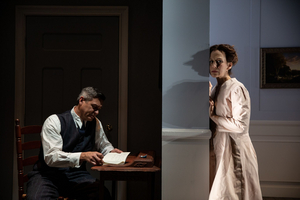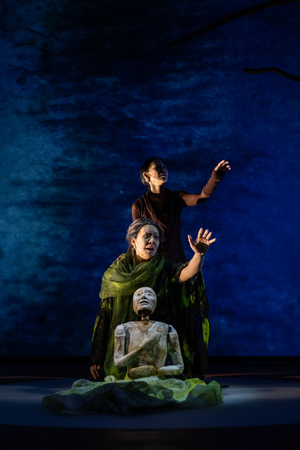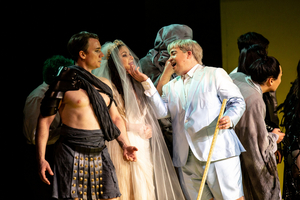BWW Reviews: Once Again, PROTOTYPE Shows What "Opera-Theatre-Now" Means to Musical Life in New York
This year's edition of PROTOTYPE, which refers to itself as "Opera-Theatre-Now," has comes and gone. You never know what to expect, for better or for worse: Try guessing what's going to be "the next big thing" at your own peril, even if it has played somewhere else first, for they things might not be what you expected at all.
I had a look-and-listen at three of this year's six offerings and there wasn't one I was sorry to have seen, no matter how odd or needing some further work some of the material was.
ELLEN WEST

ELLEN WEST. Photo: Maria Baranova
I'll start with ELLEN WEST, which had its premiere last summer at Larry Edelson's Opera Saratoga, in a co-production with Beth Morrison Projects (which also happens to be one of the producers of Prototype with HERE).
It's an agonizingly rendered chamber work by composer Ricky Ian Gordon, who managed to combine many musical styles in his score, including snippets of Puccini (TOSCA) and Bellini (NORMA)and a libretto/poem by Frank Bidart. Bidart started out writing what he refers to as "lugubrious plays" before turning to poetry and "lugubrious" pretty much describes ELLEN WEST as well. It walks that fine line between opera and music theatre and, luckily, had a small but highly effective cast to help pull it off.
For me, the highlight of the evening was the portrayal of the afflicted title character by the brilliant soprano Jennifer Zetlan; I've heard her a number of times before, but never in quite so virtuosic a performance. In truth, I thought she made a strong case for finetuning the work into a monodrama rather than a multicharacter piece.
I wasn't sure whether it was the opera itself that needed more development or that director Emma Griffin that was unable to wrangle more facets of the main character into a clearer whole. But, for me, it was hard to monitor enough of West's decline as the short but tortured evening went on.
Nonetheless, Zetlan did outstanding work in making the tale of gender and eating disorder issues an emotional tour-de-force with the material she was given. Her strong soprano showed off some of the best aspects of Gordon's score, though I thought some nonsinging aspects of the score that brought in Maria Callas's weight issues went a bit overboard--making them highlights rather than simply elements of the score.
The other major characters--doctor, husband, poet--went to baritone Nathan Gunn, who too often was assigned a declarative rather than singing style in setting out West's problems. Having heard him at the Met and elsewhere I couldn't help that he (and we) had been short-changed by this.
I'm not sure that Marla Phelan as the Woman and Carlo Antonio Villanueva as the Man as orderlies dealing with West's behavioral neuroses brought enough to the rodeo, but I thought it was more about the material they were given than the work they did.
Music director Lidiya Yankovskaya and the Aeolus Quartet did a fine job in bringing out the best elements of Gordon's score, while the simple scenic design by Laura Jellinek and effective lighting added smartly to the overall stage effect.
BLOOD MOON

Aunt. BLOOD MOON. Photo: Maria Baranova
BLOOD MOON has a fascinating score by Garrett Fisher and modern libretto by Ellen McLaughlin based on a centuries-old Noh play. The story is simple, yet not so simple: If only we had the chance to go back and make amends for the lights we have made against those who have died. It was brilliantly put together by director Rachel Dickstein, who managed to cover some holes in the libretto.
The story in brief: a nephew abandoned his elderly aunt 40 years before and never looked back--until it is too late though he tries to make amends. It is a fairytale with no happy ending, just haunted characters that have no hope of redemption (at least that's how I saw it). The nephew is brought back by the Blood Moon, sung by countertenor Juecheng Chen, who was a strong physical presence but was less successful in verbally conveying his part of the story.
The nephew and aunt have a complex relationship, even in death. It is made even more so by the bifurcation of the aunt's role between the richly powerful singing actress, mezzo Nina Yoshida Nelsen, and a puppet version (designed by Erik Sanko), brought alive by Takemu Kitamura. The nephew, sung by the strong-voiced bass Wei Wu, interacts with both versions of the abandoned relative, although it seems unclear why at any particular moment. Nonetheless, their music has been written in such an assured idiom that any dramatic shortcomings don't quite seem to matter
Fisher--who incorporates elements of Western and Japanese music--has scored the piece for an unusual ensemble, including a viola da gamba and harmonium, a taiko (a kind of drum), flutes and keyboard that run the gamut of emotions that the character may be thinking but not vocally expressing. As conducted by the conductor Steven Osgood--who has worked his magic on many contemporary operas--it is hypnotic and magical.
The imaginative scenic design by Susan Zeeman Rogers, lit by Yuki Nakase Link, and the costume design by Maiko Matsushima drew us in to the piece--and to the characters and their unhappy lives.
REV. 23

Maniaci in REV. 23. Photo: Maria Baranova
You might be able to tell from the descriptions of the two operas above that, as usual, there is little (if any) humor in their stories. (Indeed, humor seems to have little place in contemporary opera at all.) Cerise Lim Jacobs' and Julian Wachner's REV. 23, coproduced by Trinity Church Wall Street, made up for it, in spades.
When I spoke to Jacobs last week, she let me know in no uncertain terms that she clearly believes that too much is never enough. Thus, she decided that there was room for one more chapter after the Apocalypse in the New Testament's Book of Revelation 22: REV. 23--or, at least, there is in the world of opera. (And a darkly comic vision, no less.) It is the fictional, hypothetical chapter that St. John the Divine would have written if he had gone one step further. The gist: There's more to life than fun--even if you'd never know it from the shenanigans of REV. 23, where light is dark and dark is light.
I can't say I understood all the allusions she incorporated into her libretto, but what was there was more comic that the usual rundown of works at Prototype has in total. The gist: Now that Judgment Day has arrived, only Paradise remains, made of perfection and endless summer--the equivalent of Fort Lauderdale during Spring Break.
Lucifer has been banished to the bowels of hell and conspires with Hades, one of several Greek characters Jacobs has added to the Book of Revelation, to plot the destruction of Paradise. They bring along the Furies for good measure, since they've been out of work since goodness and light took over.
They find their perfect collaborator in Persephone, the queen of the Underworld, the only god who can pass back and forth between Paradise and hell, who's gotten tired of all-that-goodness-all-the-time and coerce her into bring winter and darkness back, just for kicks.
Bringing on Sun Tzu, whose "Art of War" is devoted to an aspect of warfare and how it applies to military strategy and tactics, as a consultant, she heads for the Garden of Eden to get the ball rolling.
You get the picture: It's what some people might call blasphemy but others will see it as a long overdue hoot and a holler for Prototype.
Jacobs was matched by Wachner's fearless score, that incorporated elements from everyone from Glass to Sondheim, with a little Handel thrown in for good measure. Not every bit of music was an eclectic compilation from the book of 20th and 21st century composers, but Wachner clearly had some fun throwing things together into a food processor and coming up with a less-than-Angel's- (or in this opera's world, Archangel) food cake.
The cast--under indie opera's favorite director, James Darrah, and dynamic music director Daniela Candillari with the NOVUS NY--seemed ready for anything that Jacobs and Wachner had to throw at them. These included the clever and smooth baritone Alexander Birch Elliott as Lucifer, the wry tenor Kyle van Schoonhoven as Hades and the game soprano Colleen Daly as Persephone.
Also in the mix was countertenor Michael Maniaci as Archangel Michael and the amusing Paul An as Sun Tzu. Soprano Anna Schubert, soprano Naomi Louisa O'Connell and mezzo Melanie Long were a perfect trio as the Furies. Brian Giebler's high tenor made for a fine Adam and soprano Sophia Byrd his match as Eve.
I can't say that Adam Rigg's scenic design had me dancing in the aisles, but I suppose it's what Darrah had in mind, although Molly Irelan had some good ideas for the costumes.
Prototype 2020 is now a memory. I can't wait to see what they have up their collective sleeves for the next time around.
Add Your Comment
Videos
.png)
